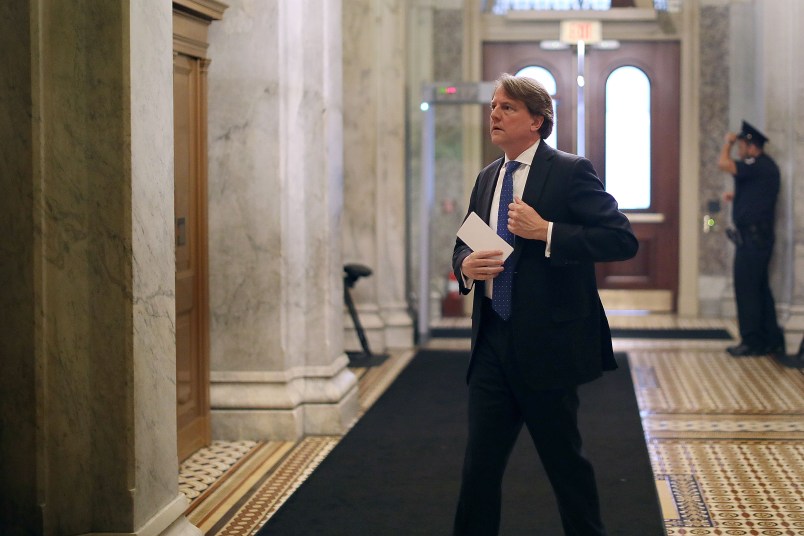The House Judiciary Committee filed a lawsuit on Wednesday seeking to enforce a subpoena it issued to former White House counsel Don McGahn, marking the first stage in a judicial battle between the legislative and executive branches over whether President Trump – or any sitting president – can be held accountable for alleged crimes committed while in office.
In the lawsuit – filed in D.C. federal court – the House writes that it “is now determining whether to recommend articles of impeachment against the President,” and refers to McGahn as its “most important witness.”
Rep. Jerry Nadler (D-NY), chair of the Judiciary Committee, issued a subpoena in April to McGahn in connection with a probe of whether President Trump obstructed justice during the Mueller investigation.
In the complaint, the House writes that the Mueller report “unmistakably invokes Congress’s role” in “addressing presidential misconduct.”
The filing states that the “process is underway,” and goes on to reference recently introduced articles of impeachment.
Under a standing memo from the Justice Department’s Office of Legal Counsel, the president cannot be indicted while in office. As the complaint alleges, it then falls to Congress as “the sole body that can hold the President accountable.”
The House goes on to cite Trump’s – and the DOJ’s – decision to block McGahn from testifying, saying that it impedes the House’s “urgent duty” in determining whether to approve articles of impeachment.
McGahn was a key witness in the Mueller report’s obstruction volume. At one point, he threatened to resign rather than issue an order for then-Deputy Attorney General Rod Rosenstein to fire Mueller, and later refused to make a public statement that would have allegedly created a false record about the attempted removal of Mueller.
The panel asserts that it has a “specific need” for McGahn’s testimony as part of its inquiry into Trump’s alleged crimes. The former White House counsel “witnessed or participated in” events relating to “nearly all of the most egregious episodes of possible Presidential obstruction,” the filing says.
The lawsuit cites Trump’s refusal to sit down for an interview with Mueller as a reason for McGahn’s importance, saying that his testimony would be a “critical aid” in evaluating Trump’s intent.
Judiciary also details its efforts to obtain relevant information through other means. At one point, the lawsuit cites Nadler’s subpoena to former White House communications director Hope Hicks. White House attorneys objected 155 times to questions asked of Hicks during her testimony, the filing says as part of an argument that Trump has “blocked” the investigation in other ways as well.
For that interview, the White House asserted “absolute immunity” over Hicks’s answers. That basis has “no grounding” in the Constitution and would “eviscerate” Congress’s oversight function if upheld, the House argues.
Trump’s efforts to block the investigation “strike at the core of Congress’s mandated role in our constitutional system,” the House argues.
The filing adds that the Judiciary Committee has an “urgent” role in examining whether “improper political considerations are causing DOJ to open new investigations,” suggesting a broader scope to the inquiry than previously known.
“Each day that McGahn refuses to testify, the Judiciary Committee is deprived of its ability to carry out the significant Article I task of determining whether to recommend that the President be impeached and potentially removed from office,” the complaint concludes.
Read the lawsuit here:







Would Trump’s ego ever allow him to follow Nixon’s path and resign rather than being impeached?
No.
Next Question?
Staff stays on task while Reps are in recess. This is good.
If you read the footnote on the signature page, it appears that the summer interns wrote the complaint.
Ok